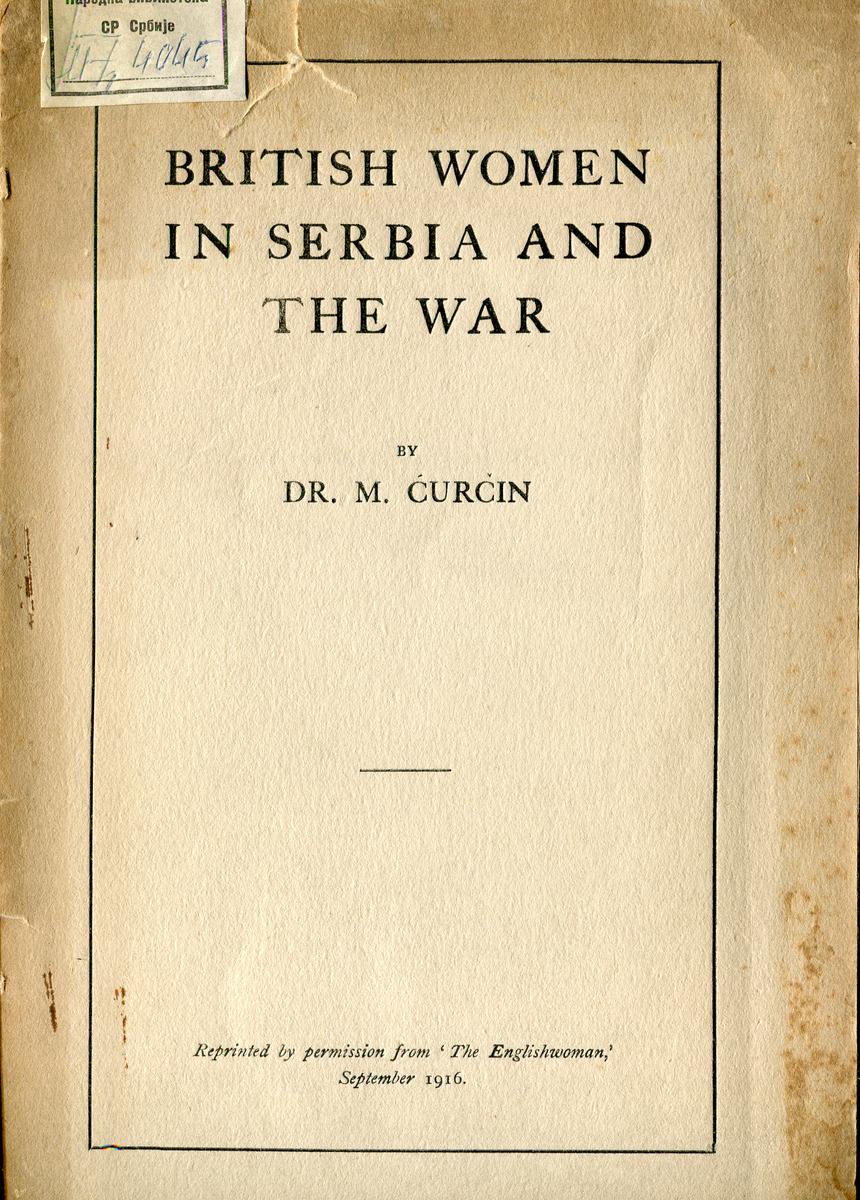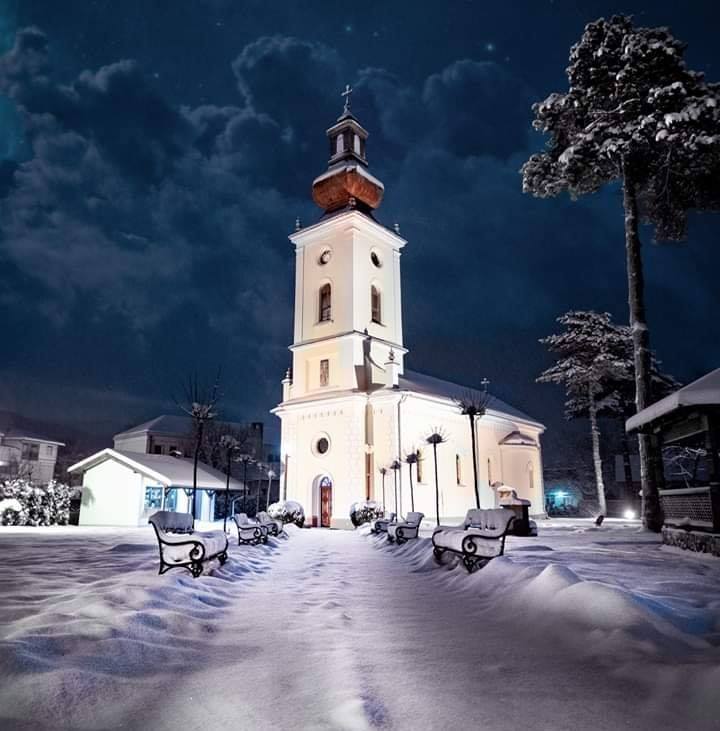SERVIA,
YOUNGEST MEMBER OF THE EUROPEAN FAMILY:
OR, A
RESIDENCE IN BELGRADE,
AND
TRAVELS IN THE HIGHLANDS AND WOODLANDS OF THE INTERIOR,
DURING THE YEARS 1843 AND 1844.
BY
ANDREW ARCHIBALD PATON, ESQ.
CHAPTER IV.
Leave Widdin.—The Timok.—Enter Servia.—Brza Palanka.—The Iron Gates.—Old and New Orsova.—Wallachian Matron.—Semlin.—A Conversation on Language.
I left Widdin for the Servian frontier, in a car of the country, with a couple of horses, the ground being gently undulated, but the mountains to the south were at a considerable distance. On our right, agreeable glimpses of the Danube presented themselves from time to time. In six hours we arrived at the Timok, the river that separates Servia from Bulgaria. The only habitation in the place was a log-house for the Turkish custom-house officer. We were more than an hour in getting our equipage across the ferry, for the long drought had so reduced the water, that the boat was unable to meet the usual landing-place by at least four feet of steep embankment; in vain did the horses attempt to mount the acclivity; every spring was followed by a relapse, and at last one horse sunk jammed in between the ferry boat and the bank; so that we were obliged to loose the harness, send the horses on shore, and drag the dirty car as we best could up the half dried muddy slope. At last we succeeded, and a smart trot along the Danube brought us to the Servian lazaretto, which was a new symmetrical building, the promenade of which, on the Danube, showed an attempt at a sort of pleasure-ground.
I entered at sunset, and next morning on showing my tongue to the doctor, and paying a fee of one piastre (twopence) was free, and again put myself in motion. Lofty mountains seemed to rise to the west, and the cultivated plain now became broken into small ridges, partly covered with forest trees. The ploughing oxen now became rarer; but herds of swine, grubbing at acorns and the roots of bushes, showed that I was changing the scene, and making the acquaintance not only of a new country, but of a new people. The peasants, instead of having woolly caps and frieze clothes as in Bulgaria, all wore the red fez, and were dressed mostly in blue cloth; some of those in the villages wore black glazed caps; and in general the race appeared to be physically stronger and nobler than that which I had left. The Bulgarians seemed to be a set of silent serfs, deserving (when not roused by some unusual circumstance) rather the name of machines than of men: these Servian fellows seemed lazier, but all possessed a manliness of address and demeanour, which cannot be discovered in the Bulgarian.
Brza Palanka, at which we now arrived, is the only Danubian port which the Servians possess, below the Iron Gates; consequently, the only one which is in uninterrupted communication with Galatz and the sea. A small Sicilian vessel, laden with salt, passed into the Black Sea, and actually ascended the Danube to this point, which is within a few hours of the Hungarian frontier. As we approached the Iron Gates, the valley became a mere gorge, with barely room for the road, and fumbling through a cavernous fortification, we soon came in sight of the Austro-Hungarian frontier.
New Orsova, one of the few remaining retreats of the Turks in Servia, is built on an island, and with its frail houses of yawning rafters looks very old. Old Orsova, opposite which we now arrived, looked quite new, and bore the true German type of formal white-washed houses, and high sharp ridged roofs, which called up forthwith the image of a dining-hall, where, punctually as the village-clock strikes the hour of twelve, a fair-haired, fat, red-faced landlord, serves up the soup, the rindfleisch, the zuspeise, and all the other dishes of the holy Roman empire to the Platz Major, the Haupt-zoll-amt director, the Kanzlei director, the Concepist, the Protocollist, and hoc genus omne.
After a night passed in the quarantine, I removed to the inn, and punctually as the clock struck half past twelve, the very party my imagination conjured up, assembled to discuss the mehlspeise in the stencilled parlour of the Hirsch.
Favoured by the most beautiful weather, I started in a sort of calêche for Dreucova. The excellent new macadamized road was as smooth as a bowling-green, and only a lively companion was wanting to complete the exhilaration of my spirits.
My fair fellow-traveller was an enormously stout Wallachian matron, on her way to Vienna, to see her daughter, who was then receiving her education at a boarding-school. I spoke no Wallachian, she spoke nothing but Wallachian; so our conversation was carried on by my attempting to make myself understood alternately by the Italian, and the Spanish forms of Latin.
“Una bella Campagna,” said I, as we drove out Orsova.
“Bella, bella?” said the lady, evidently puzzled.
So I said, “Hermosa.”
“Ah! formosa; formosa prate,” repeated the lady, evidently understanding that I meant a fine country.
“Deunde venut?” Whence have you come?
“Constantinopolis;” and so on we went, supposing that we understood each other, she supplying me with new forms of bastard Latin words, and adding with a smile, Romani, or Wallachian, as the language and people of Wallachia are called by themselves. It is worthy of remark, that the Wallachians and a small people in Switzerland, are the only descendants of the Romans, that still designate their language as that of the ancient mistress of the world.
As I rolled along, the fascinations of nature got the better of my gallantry; the discourse flagged, and then dropped, for I found myself in the midst of the noblest river scenery I had ever beheld, certainly far surpassing that of the Rhine, and Upper Danube. To the gloom and grandeur of natural portals, formed of lofty precipitous rocks, succeeds the open smiling valley, the verdant meadows, and the distant wooded hills, with all the soft and varied hues of autumn. Here we appear to be driving up the avenues of an English park; yonder, where the mountain sinks sheer into the river, the road must find its way along an open gallery, with a roof weighing millions of tons, projecting from the mountain above.
After sunset we arrived at Dreucova, and next morning went on board the steamer, which conveyed me up the Danube to Semlin. The lower town of Semlin is, from the exhalations on the banks of the river, frightfully insalubrious, but the cemetery enjoys a high and airy situation. The people in the town die off with great rapidity; but, to compensate for this, the dead are said to be in a highly satisfactory state of preservation. The inns here, once so bad, have greatly improved; but mine host, zum Golden Löwen, on my recent visits, always managed to give a very good dinner, including two sorts of savoury game. I recollect on a former visit, going to another inn, and found in the dining-room an individual, whose ruddy nose, and good-humoured nerveless smile, denoted a fondness for the juice of the grape, and seitel after seitel disappeared with rapidity. By-the-bye, old father Danube is as well entitled to be represented with a perriwig of grapes as his brother the Rhine. Hungary in general, has a right merry bacchanalian climate. Schiller or Symian wine is in the same parallel of latitude as Claret, Oedenburger as Burgundy, and a line run westwards from Tokay would almost touch the vineyards of Champagne. Csaplovich remarks in his quaint way, that the four principal wines of Hungary are cultivated by the four principal nations in it. That is to say, the Slavonians cultivate the Schiller, Germans the Oedenburger and Ruster, Magyars and Wallachians the Menesher. Good Schiller is the best Syrmian wine. But I must return from this digression to the guest of the Adler. On hearing that I was an Englishman, he expressed a wish to hear as much of England as possible, and appeared thunderstruck, when I told him that London had nearly two millions of inhabitants, being four hundred thousand more than the population of the whole of the Banat. This individual had of course learned five languages with his mother’s milk, and therefore thought that the inhabitants of such a country as England must know ten at least. When I told him that the majority of the people in England knew nothing but English, he said, somewhat contemptuously, “O! you told me the fair side of the English character: but you did not tell me that the people was so ignorant.” He then good-humouredly warned me against practising on his credulity. I pointed out how unnecessary other languages were for England itself; but that all languages could be learned in London.
“Can Wallachian be learned in London?”
“I have my doubts about Wallachian, but”—
“Can Magyar be learned in London?”
“I suspect not.”
“Can Servian be learnt in London?”
“I confess, I don’t think that any body in London teaches Servian; but”—
“There again, you travellers are always making statements unfounded on fact. I have mentioned three leading languages, and nobody in your city knows anything about them.”



